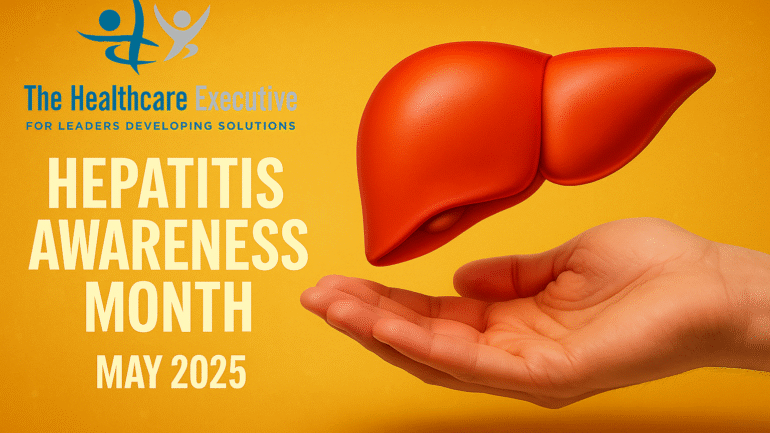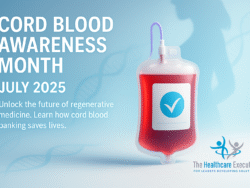Hepatitis Awareness Month – May 2025

- Posted by Greg Wahlstrom, MBA, HCM
- Posted in Health Observance Calendar
Hospital Strategy in Prevention, Equity, and Community Engagement
Published: May 4, 2025
May is Hepatitis Awareness Month, a critical observance for hospitals and health systems advancing equity, prevention, and early intervention for viral hepatitis. An estimated 3.5 million people in the U.S. live with chronic hepatitis B or C—many of them undiagnosed. Healthcare executives must take the lead in integrating hepatitis screening, vaccination, and public health outreach into core hospital operations. At organizations like NYC Health + Hospitals, leadership teams have launched targeted hepatitis C screening initiatives for high-risk populations, including those experiencing homelessness and substance use. These programs reflect a growing recognition: viral hepatitis is not just a clinical issue—it is a systems issue rooted in access and trust. Hospitals must partner with community organizations and public health departments to identify gaps and deliver culturally competent interventions. Prevention begins in the community, but it scales with strategy. Executives who act during Hepatitis Awareness Month send a message that prevention is not optional—it’s operational.
Vaccination remains a cornerstone of hepatitis prevention, yet barriers to access persist. In many underserved communities, hepatitis B vaccines remain underutilized due to stigma, misinformation, or lack of outreach. Health systems like Kaiser Permanente have responded with mobile vaccine clinics and EHR-flagged reminders for hepatitis immunizations during well visits. For hospitals serving diverse populations, executive leaders should ensure language access, community-specific education, and consistent data tracking around vaccine completion. Integrating hepatitis prevention into maternal health, addiction medicine, and chronic care coordination is essential. Board-level governance should require quarterly reporting on immunization gaps and improvement efforts. The business case is clear: preventing hepatitis saves lives and reduces costly complications like liver cancer and cirrhosis. More importantly, it reflects a hospital’s values in action. Leadership must move beyond awareness and into accountability.
Digital transformation is accelerating hepatitis prevention strategies across the country. From text-based outreach to geotargeted screening reminders, technology is helping hospitals reach patients where they are. At UCSF Health, data dashboards identify zip codes with low screening uptake and guide strategic partnerships with local organizations. Leaders are using AI tools to stratify risk and automate EHR triggers for hepatitis labs during ED visits. But tech alone won’t drive outcomes. These tools require oversight, integration, and alignment with real-world disparities. C-suite leaders must ensure that digital efforts are inclusive, privacy-conscious, and supported by culturally responsive care teams. Hospitals must also invest in staff education on hepatitis care pathways and stigma-free patient communication. When digital strategy aligns with equity and access, hepatitis prevention becomes not just effective—but transformative. Innovation without inclusion is a missed opportunity for public health leadership.
Stigma remains one of the greatest barriers to hepatitis care. Many patients delay testing or treatment due to fears of judgment or misunderstanding from the healthcare system. Health systems like Montefiore Medical Center are tackling this head-on with peer navigator programs and trauma-informed care training. Leadership must elevate anti-stigma training to the same level as clinical competencies. This includes updating intake forms, ensuring nonjudgmental communication, and offering wraparound support for those affected by hepatitis and substance use. Executive teams should also support patient advisory councils and partner with advocacy groups to keep messaging grounded in real experiences. Human-centered design isn’t just for apps—it belongs in every exam room and waiting area. Hospitals that dismantle stigma strengthen trust and long-term engagement. Hepatitis care is not just about the liver—it’s about the people we serve. And people follow systems that see them fully.
As we recognize Hepatitis Awareness Month 2025, hospital leaders must act with urgency, empathy, and strategic intent. This observance is an opportunity to reflect on how systems can evolve from reactive treatment to proactive prevention. Whether through expanding vaccination, scaling community screening, or investing in stigma-reducing care models, executive leadership is the catalyst for change. Hospital boards must set measurable goals, track community health impact, and commit budgetary support to viral hepatitis strategy. Because the truth is this: hepatitis is preventable, treatable, and—when led well—eliminable. Leadership defines whether our systems are contributors to the problem or architects of the solution. This May, let your strategy speak louder than your slogan.
Discover More:
Explore how hospital systems are responding to infectious disease observances with community-centered innovation and equity-first strategy.
Internal Links
- World Day for Safety and Health at Work 2025
- Rebuilding Trust in U.S. Healthcare: A Leadership Blueprint
- Global Employee Health and Fitness Month 2025



